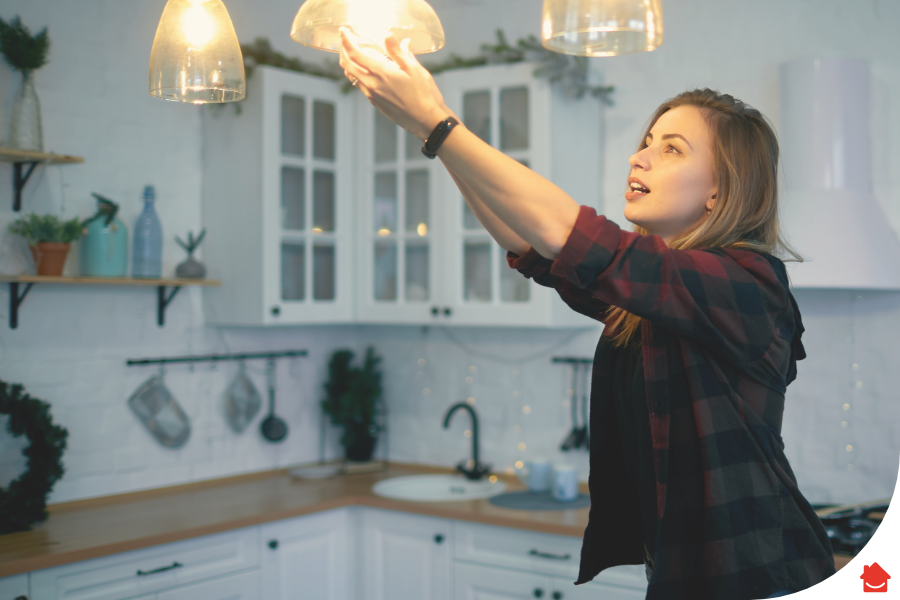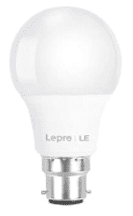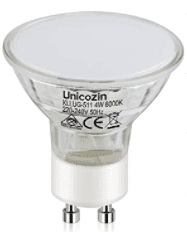Energy saving advice
How can lighting efficiency be improved?
16 Jun 2021 • 5 minutes


Without light bulbs, life would look a lot darker in our homes, but how can we become more energy efficient? We’re here to help you shine a light on energy efficiency and show you how to start making a saving on your bills, as well as doing your bit for the planet.
Energy efficiency is all about finding better ways of performing everyday tasks around the home – whether it’s switching off the lights, only turning the heating on at certain times of the day or unplugging your appliances when you’re not using them, every little helps. It not only means you could start making a saving on your bills, but you’ll be doing your bit for the planet too. So, let’s get started…
Did you know, energy efficiency in the home is measured by an Energy Performance Certificate (EPC)? It features factors such as:
Read our article on what the minimum energy efficiency standards are for your home.
When it comes to energy efficiency, there are so many ways in which you can benefit. Here are a few reasons why conserving energy is so important to you and your home:
Energy costs can take up a significant amount of your monthly outgoings. Energy efficient appliances, such as A-rated washing machines and tumble dryers, consume less energy, which over time will turn into a saving on your bills.
You could also consider protecting your kitchen appliances in the event of an unexpected breakdown to help you save on potentially costly repairs.
Energy efficient homes may sell for a higher price than standard homes with similar features. Selling with the expectation of reduced utility bills can be seen as an attractive feature for new buyers.
Our homes are responsible for a certain percentage of greenhouse gas emissions so putting measures in place to make yours more efficient may help reduce your carbon footprint.
Believe it or not, it’s not just about what lightbulb we use, it’s how we use our lighting and what impact it may have if we were to change the way we use it.
Let’s go through some things to help improve your home’s lighting efficiency!
There are three types of energy-saving light bulbs you can buy for your home:

LEDs have around a £7 a year saving per bulb (compared to a standard incandescent bulb). They use 90% less energy too!

CFLs have around a £7 a year saving per bulb (compared to a standard incandescent bulb). They also use 70-80% less energy.

Halogens use 20-30% less energy (compared to a standard incandescent bulb)
It’s the simple things we forget like turning the light off when we leave the room or closing the door to keep the heat in that can cost us the most. Flicking off a switch can help you save money, reduce your carbon footprint and help extend the life of your light bulbs – it’s a win win. So get everyone in your home into the habit and you’ll soon start reaping the benefits – it really is as easy as it sounds!
Controlling your lighting via smart devices is a great way of monitoring your usage. You can connect your lighting by purchasing smart light bulbs. Then all you need to do is download an app on your smartphone or tablet and you’ll be able to remotely switch them on or off instantly, wherever you are. If you’re interested in making your home smarter, this is a great place to start.
These bulbs are likely to be LEDs as they use the least amount of energy out of all the bulbs on the market. What’s more, they give you the power to keep your home secure by turning the lights on when you’re away and you can take advantage of the dimmer settings to adapt your lighting at different times during the day.
Read our article on what is a smart home to help you decide if it’s right for you.
Even though it’s hundreds of millions of miles away, the sun can provide you with that much needed natural light, and in terms of using energy, nothing is more efficient. Before you reach for the light switch, look out for that perfect spot where you’re working or relaxing to enjoy more of the sunlight we have at our disposal.
Also, why not consider protecting your property with cover for wiring, fusebox breakdowns and broken sockets? Our Home Experts will help make sure that unexpected electrical problems don’t leave you in the dark.
LEDs are the most efficient lighting option. This is because they use the least amount of energy compared to standard incandescent bulbs. They also produce the most lumens per watt, making them last longer than any other energy saving bulb.
There are three types of energy-saving light bulbs: LEDs, CFLs and Halogens.
Leaving the lights on because it takes more energy to turn them back on is a common myth. They do use a small surge of power to turn on, but it’s significantly smaller than the amount you’d save by turning them off when you don’t need them.
Our help & advice articles cover Plumbing, Home heating, Electrical, Energy-saving and Home maintenance.